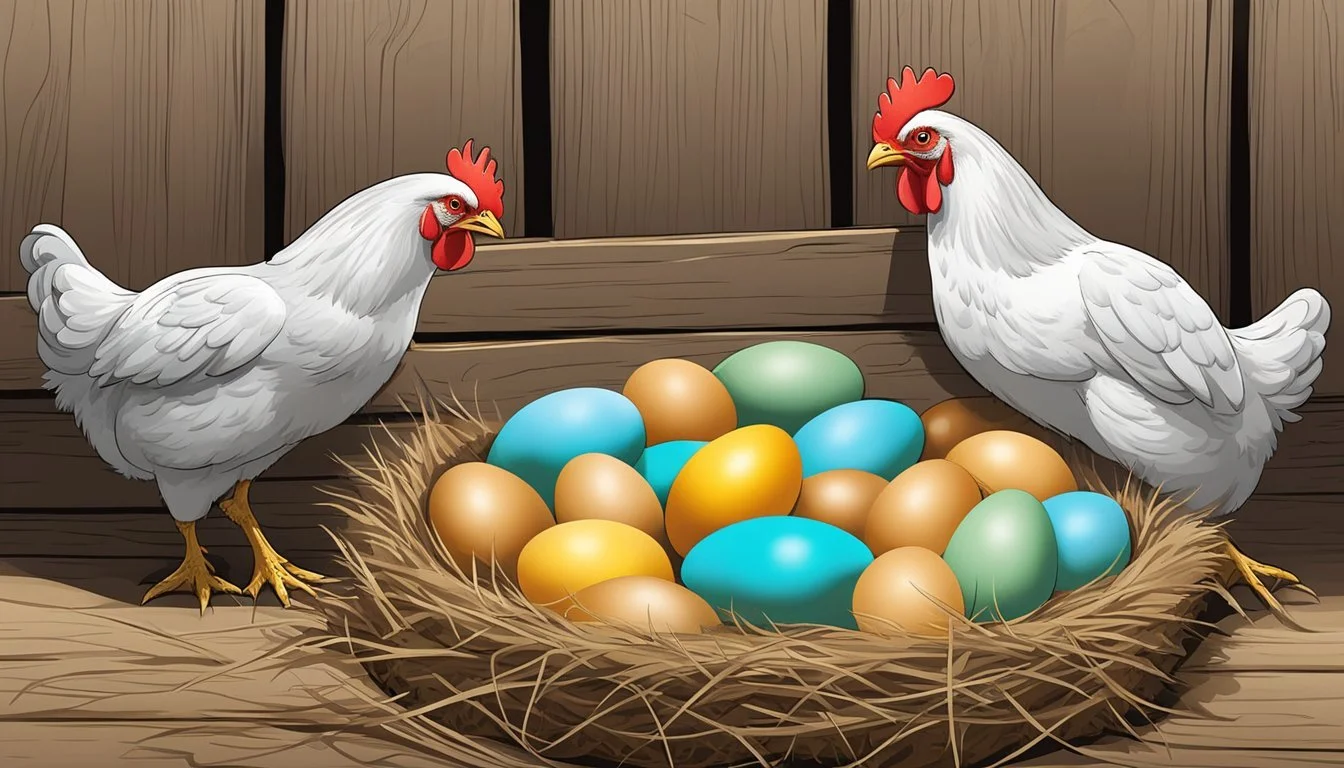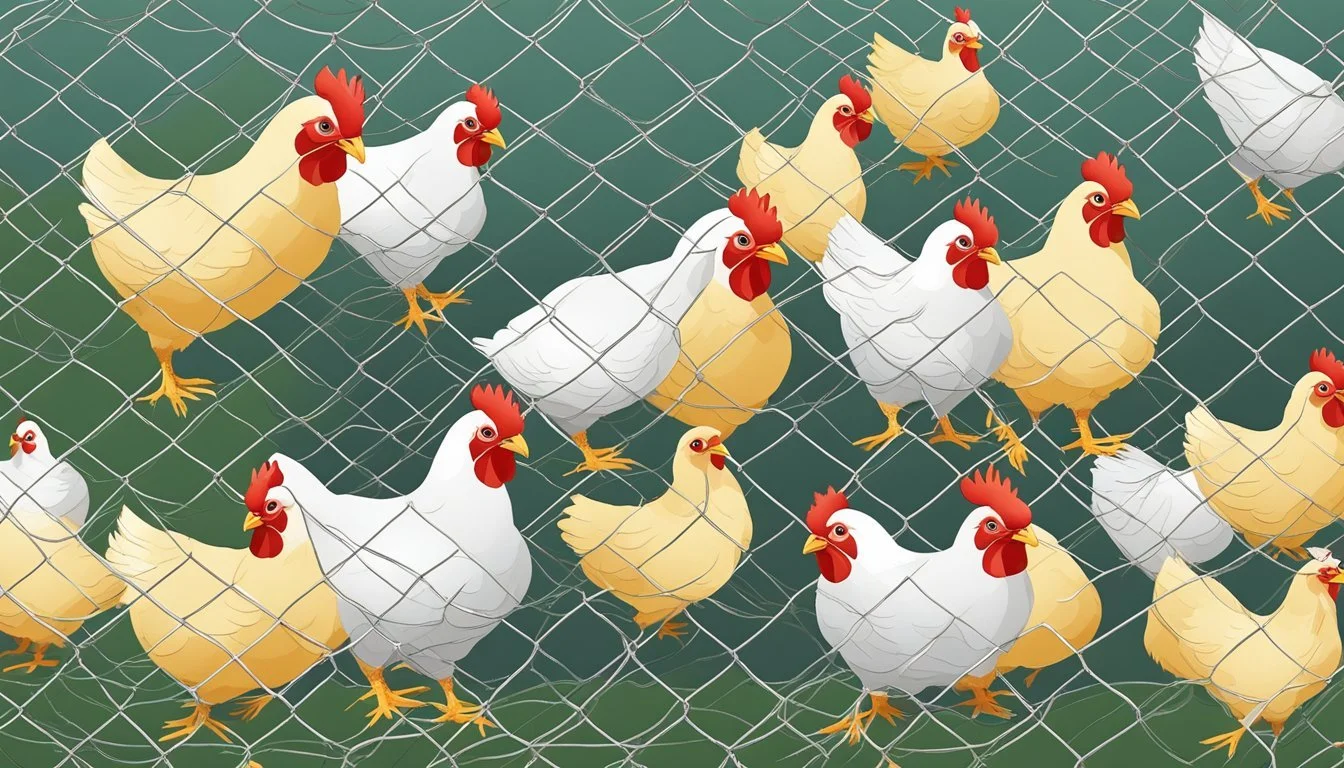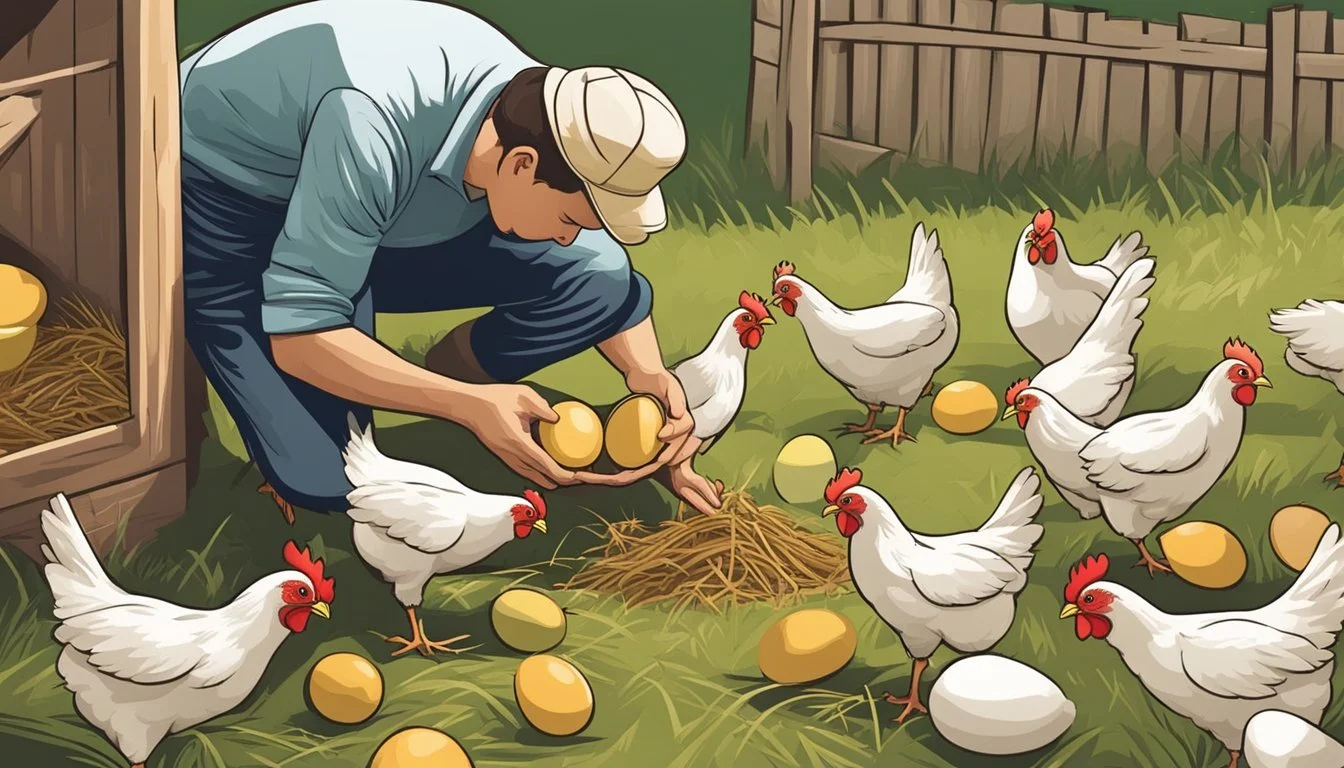How do I Prevent Egg Eating by Chickens?
Effective Strategies to Deter Unwanted Behavior
Egg eating by chickens is an undesirable behavior that can lead to significant loss of eggs within a flock. Once this habit develops, it can quickly spread among hens, making prevention and prompt action essential. There are various reasons why chickens may start eating their own eggs, including nutritional deficiencies, lack of enrichment, and accidental discovery. However, with careful management and some strategic practices, it is possible to prevent or stop this behavior.
Addressing the underlying causes is critical in deterring chickens from developing the egg eating habit. Ensuring that chickens have a balanced diet rich in calcium and protein helps in preventing nutritional shortcomings that may lead to egg eating. Additionally, maintaining a clean and comfortable environment with sufficient nest boxes minimizes the chances of eggs getting damaged and becoming targets for consumption. Frequent collection of eggs throughout the day also reduces the opportunity for the hens to peck at their eggs.
Implementing deterrents can also be effective. Some chicken keepers use methods such as filling an empty egg with mustard, which chickens generally find unpalatable, or placing dummy eggs in the nest box to discourage pecking at real eggs. By combining these interventions with good husbandry practices, the incidence of egg eating can be significantly reduced, maintaining the productivity and welfare of the chicken flock.
Understanding Egg Eating In Chickens
Egg eating in chickens is a detrimental behavior that can reduce the number of eggs available for collection and may spread among the flock. This section will cover how to identify egg eating, understand its causes, and recognize the linkage to nutritional factors.
Identifying the Habit
Habitual egg eating often begins when a hen accidentally breaks an egg and subsequently tastes it. A clear indication of egg eating is a reduction in the number of whole eggs found, and sometimes remnants of eggshells within the nesting area. Observing the flock after laying may help identify the offending hen or hens.
Causes of Egg Eating
Many factors can lead to egg eating, with poor nesting conditions being one of the most common. When eggs are laid in areas that are easily visible or accessible, they are more prone to damage, and hence, more likely to be eaten. Stress due to a high-density, competitive environment may also trigger the behavior. Reducing visibility of eggs and providing a calm environment can help prevent the development of this behavior.
Nutritional Deficiencies and Diet
A proper diet plays a crucial role in preventing egg eating. Nutritional deficiencies, particularly in calcium and protein, can drive hens to consume their own eggs. Ensuring that laying hens receive adequate levels of calcium and protein can deter the practice. Diets should consist of a well-balanced layer feed, and if supplementing with eggshells, these should be cooked to prevent the hens from recognizing and developing a taste for raw eggs.
Preventive Measures
Preventing egg eating by chickens largely revolves around creating an environment less conducive to the habit. It involves designing nesting boxes that reduce cracking, ensuring eggs are collected frequently to remove temptation, and maintaining cleanliness to discourage the behavior from developing.
Designing Proper Nesting Boxes
Nesting boxes are critical in reducing egg damage and subsequent eating. Boxes should be lined with soft materials like hay or straw to cushion the eggs as they are laid. The dimensions of nesting boxes should be conducive to a single hen's comfort, ideally with one box for every four chickens to prevent overcrowding and ensure that the fresh eggs have minimal contact with other birds until they're collected.
Regular Egg Collection
To minimize the chances of chickens eating their eggs, farmers should collect eggs often, ideally several times a day. Regular egg collection reduces the time eggs are exposed and susceptible to being pecked. Collecting eggs promptly ensures that fresh eggs are quickly removed from the chickens' environment, significantly reducing the risk of the habit forming.
Maintaining Cleanliness
Cleanliness plays a vital role in deterring chickens from egg eating. A clean coop minimizes the risk of eggs cracking or breaking, which can attract chickens to the taste of their own eggs. Regularly clean up any egg residue and refresh bedding to prevent this behavior. Alongside cleanliness, providing proper nutrition, including adequate calcium, can help ensure strong eggshells and reduce the likelihood of accidental cracks that might tempt chickens.
Dietary Adjustments
Making dietary adjustments is a pivotal aspect of preventing chickens from developing the habit of egg eating. Ensuring they receive the right nutrients will diminish their need to seek those nutrients from their own eggs.
Supplementing with Calcium
Chickens require sufficient calcium for strong eggshell production. Oyster shells are a common calcium supplement; they can be offered in a separate feeder or mixed with the main feed. This ensures that the chickens have consistent access to the calcium they need, which can deter them from pecking at their eggs.
High-Protein Feeds
Protein is another critical component of a chicken's diet, especially in layer feed, which supports the demands of producing eggs. A lack of protein can prompt chickens to eat their own eggs as a source. Incorporating high-protein feeds or supplementing their diet with items such as sunflower seeds can help to satisfy their protein requirements.
Healthy Treat Alternatives
Chickens often peck at eggs out of curiosity or boredom. Offering healthy treat alternatives can redirect this behavior and provide additional nutrition. Feeding a measured amount of nutritious treats, like small amounts of fruits or vegetables, provides the chickens with a variety of foods to peck at besides their eggs.
Environmental Enrichment
Environmental enrichment is crucial for the well-being of backyard chickens, helping to prevent boredom that can lead to egg eating. By providing stimulating toys and activities, alongside ensuring adequate space and appropriate roosting areas, chickens are less likely to develop this detrimental behavior.
Providing Toys and Activities
Backyard chickens benefit significantly from a variety of toys and activities which promote natural behaviors like scratching, pecking, and foraging. Suspending cabbage heads or other vegetables just out of reach encourages chickens to jump and peck, which serves as both a physical exercise and mental stimulation. Robust items such as sturdy ladders or perches can also be installed to enrich their environment, giving chickens the opportunity to climb and explore different heights within their habitat.
Examples of toys and activities:
Hanging vegetable treats
Perches at various levels
Dust baths for foraging
Puzzles with food rewards
Adequate Space and Roosting Areas
Providing adequate space is critically important for preventing stress and promoting natural chicken behaviors. Chickens need room to move freely, stretch their wings, and engage in social behaviors without overcrowding. When it comes to nighttime, ample roosting areas are essential. They prefer to sleep off the ground for safety and comfort; hence, installing sufficient roosting bars that are properly spaced allows each chicken to roost comfortably and without competition. For free-ranging chickens, the integration of natural cover such as shrubs and trees can provide additional space for exploration and resting spots during the day.
Important aspects of space and roosting areas:
Minimum of 2-3 feet of roosting space per chicken
Multiple levels of roosts to accommodate the pecking order
Clear ground space to allow free movement and social interaction
Behavioral Interventions
In addressing the issue of chickens eating their own eggs, certain behavioral interventions can be effective. These methods aim to curb the unwanted behavior by altering the environment and the chickens' interactions with eggs.
Use of Dummy Eggsummy eg
Introducing dummy eggs into the nesting box can be a strategic deterrent. Chickens pecking at inedible objects, like a golf ball or a wooden egg, quickly learn that not all eggs yield the same result. The frustration from pecking at these hard, inedible objects often leads to a disinterest in continuing the behavior. Over time, the presence of these fake eggs reduces the likelihood of chickens pecking at real eggs.
Culling Habitual Egg Eaters
In situations where individual chickens consistently resort to eating eggs, culling may become necessary. It entails removing the habitual egg eaters from the flock to prevent them from reinforcing the behavior to others. Culling is seen as a last resort after attempts like increasing the supply of raw eggs or offering supplements to satisfy their nutritional needs have failed. It is important to ensure that chickens have access to a nutritionally complete diet to reduce the chances of egg eating due to deficiencies.
Egg Collection Practices
One of the most effective strategies for preventing chickens from eating their eggs is to implement proper egg collection practices. Careful attention to egg collection frequency and owner education can lead to significant improvements in preserving egg production.
Frequent Egg Collection
Chickens are less likely to develop the habit of egg eating when freshly laid eggs are collected often. Ideally, one should collect eggs 2-3 times a day. This routine helps ensure that eggs are removed before chickens can cause damage. It's also important to maintain clean and dry nesting material to discourage egg breakage and provide a desirable laying environment.
Educating Chicken Owners
Chicken owners should be knowledgeable about the importance of regular egg collection and its impact on egg production. They need to be aware of the best times to collect eggs, typically before midday, to ensure that eggs are not left in the nesting boxes for extended periods. Regular egg collection not only decreases the chance of egg consumption by the hens but also ensures that the owner consistently gathers a supply of fresh eggs.
Nesting Box Modifications
Modifying nesting boxes is a practical approach to preventing chickens from developing the unwanted behavior of egg-eating. Strategic designs and additions can discourage this natural but troublesome habit by addressing both visibility and accessibility.
Curtains and Privacy for Nesting
Nesting box curtains serve as an effective deterrent to egg-eating. They offer privacy to laying hens and reduce the temptation for other chickens to peck at the eggs. Nesting box curtains should be made from a lightweight material that hens can easily move aside. The addition of these curtains makes the interior of the box less visible, adhering to the 'out of sight, out of mind' principle, which can be a significant step in curbing egg-eating behavior.
Slanted and Elevated Nesting Boxes
Constructing slanted nesting boxes can significantly reduce egg-eating. The slope prevents eggs from being easily accessible for pecking, as they roll away into a protected area of the box, out of reach of the hens. Additionally, nesting boxes should be elevated, at least 2 feet off the ground, which not only helps prevent egg-eating but also protects the eggs from predators.
These boxes should also be lined with at least 2 inches of clean, dry nesting material like straw or wood shavings. This helps keep the eggs intact upon laying, further reducing the risk of breakage and subsequent egg-eating. Regular maintenance of this material is essential; it should be kept clean and dry at all times to be effective.
Protection From Predators
Protecting your flock from egg-eating by predators requires diligent security measures and monitoring. Predators like snakes, rats, weasels, and skunks can be deterred through proper coop fortification and the use of technology.
Securing the Chicken Coop
To safeguard chickens from predators, one must go beyond simple chicken wire, which provides inadequate protection. It's essential to use 1/2 inch hardware cloth to cover any openings Dos and Don'ts When Protecting Chickens from Predators. Hardware cloth is a sturdy, welded wire material that is difficult for predators to rip open, ensuring even the smallest of apertures are well-protected. Regular inspections of the coop to check for potential breaches are equally important.
Monitoring with Nestbox Cameras
Installing nest box cameras can be a game-changer in detecting and deterring predators. A well-positioned camera allows poultry owners to observe any unusual activities within the coop, especially when potential predators like snakes or rats might be involved. This technology acts not only as a surveillance tool but also as a preventive measure, since owners can promptly respond to any observed threats.
Managing The Flock
To deter egg eating in chickens, effective flock management strategies are essential. This not only involves identifying and addressing individual behavioral issues but also pertains to the general well-being of the flock, which can significantly impact the occurrence of such behaviors.
Culling as a Last Resort
Culling should be considered only when other methods fail. One identifies the egg-eating chicken by the remnants of egg yolk on its beak or plumage. If behavioral adjustments and environmental enrichments do not correct the issue, removing the culprit from the flock is advised to prevent influencing other members.
Dealing with Molt and Broodiness
During molt, chickens can become irritable and more prone to exhibit undesirable behaviors such as egg eating. Providing a high-quality diet rich in protein can help them through this phase more quickly. Separating broody hens is beneficial since their removal prevents operational disruption and potential egg damage due to their nesting habits.
Reducing Stress in the Flock
Stress reduction in the flock is pivotal. This can be accomplished by ensuring adequate space, minimizing bright lights which can be startling, and implementing a consistent routine to avoid boredom and restlessness. Diversion strategies such as providing fodder or pecking blocks can help reduce boredom and the resulting stress behaviors.
Supplementary Information
In addressing the issue of egg eating among chickens, it is valuable to look beyond conventional approaches and consider additional strategies that can aid in preventing this behavior. Key areas to focus on include the housing system employed, the diversity of the diet provided to the chickens, and the use of eggshell supplements to address potential nutritional deficiencies.
Alternative Housing: Chicken Tractors
Chicken tractors are a movable chicken coop lacking a floor and provide an alternative housing solution that could help deter egg-eating behaviors. This system allows chickens to access fresh grass and insects leading to a more varied diet. Not only does this promote overall hen health, but it also reduces boredom—a potential factor in egg eating. Moving the chicken tractor regularly ensures the birds are always on fresh ground, potentially decreasing the stress that can contribute to egg-eating habits.
Providing Variety in Feed
Chickens with a varied diet are less likely to develop behavioral problems like egg eating. It's important to offer scratch grains and cracked corn as part of their diet to keep them engaged in natural foraging behavior. Additionally, incorporating protein snacks, such as mealworms, can prevent protein deficiency leading to egg eating. Compost or other food scraps can also be an excellent addition to their diet, providing both variety and additional nutrients.
Utilizing Eggshell Supplements
A nutritional deficiency in hens, particularly a lack of calcium, can lead to egg breakage and subsequent egg eating. Supplementing their diet with lime or crushed eggshells can help prevent this issue. Feed-grade limestone is a common supplement for laying hens, as it provides the necessary calcium to strengthen eggshells. Using eggshell supplements also offers a practical way to recycle eggshells, turning potential waste into a valuable resource. However, it’s essential to bake the eggshells before crushing them to eliminate any raw egg residue and prevent chickens from developing a taste for them. Some chicken owners even use ceramic eggs as a preventive measure; they’re similar in size and weight to real eggs but dissuade the behavior when pecked due to their hardness.







